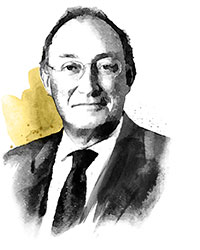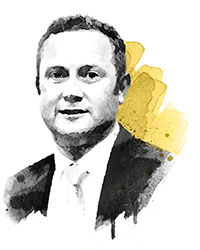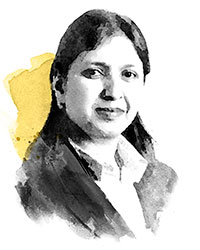In January 2008, financial journalist Clay Harris produced his first Mudlark column for The Review. In historical terms, the word ‘mudlark’ denotes the scavengers who searched for washed-up items of value on the banks of the river Thames in the 18th and 19th centuries. Clay’s column – which he wrote for The Review between 2008 and 2013 – sought to unearth the ‘jewels’ buried in the back office and shed light on the achievements and career paths of people who might otherwise have been overlooked.
We caught up with four Mudlark interviewees to find out how their careers have developed in the years since they were interviewed, explore the changes they’ve encountered in the sector, and highlight the insights and advice they can offer younger financial services professionals at the start of a new decade.

Tani Nagele, senior manager, JM Finn
Date originally interviewed: January 2008
Role when interviewed: Client administration manager, JM Finn
Tani was the first ever interviewee for the Mudlark column. She now has 40 years' experience in the sector.
Tani in Mudlark, January 2008Tani had benefited from internal training throughout her career. At 18 years old, she received training in the stocks and shares department at Coutts – notable at the time for its all-male sherry club – then took on several different roles at other firms, including a compliance role that required her to take Personal Investment Authority exams, and temporary roles at organisations including RBS Trust Bank and Citi Private Bank. Her career progression was blocked when she “ran into policies that only graduates could be managers”. But in 2001 she was recruited to JM Finn by Frank Reardon, Chartered FCSI, now chair of the CISI Operations Forum and a member of the Review Editorial Panel, to help run the back office.
What’s changed?Tani is now a senior manager within the Investment Administration Department, with responsibility for overseeing four out of eight departments. She provides support and training for managers and staff, ensuring compliance with FCA regulations.
An increase in regulation – and the subsequent automation that has been brought in to match this cultural shift – are two major changes that she’s experienced: “We have seen people’s daily workloads turning more towards monitoring and controls, rather than the traditional ‘inputting’ role.”
Tani now communicates with clients predominantly through email, unlike the days when “your favourite stockbroker would wander round for a leisurely chat”. Training has become more structured, with the one-to-one, on-the-job training of the past gradually replaced by individual training plans, internal seminars and workshops and online courses.
Lessons learnt and tips for younger financial services professionals“Learn as much as you can and study for the sector exams. In today’s regulatory environment, it’s important to keep up with the current requirements. A good grounding in the broader aspects of the sector also helps to prepare people for more senior roles. This can be through background reading, working within different departments, or volunteering to help with special projects within the firm,” she says.

Tony Solway, chair, Sionic
Date originally interviewed: February 2008
Role when interviewed: Head of securities services, UK division, BNP Paribas
In February 2008, Tony held multiple roles, including that of chair for nine other BNP Paribas businesses in the UK in the fields of general insurance, property and private banking. Tony is now 60, with 40 years’ experience in the sector.
Tony in Mudlark, February 2008Like Tani, Tony benefited from internal training. After graduating from Cambridge university with a degree in history, he began his financial services career with an induction course at Andersen Consulting, then joined the Henderson investment management group. There, Tony devised and actioned an IT strategy in his role as director of systems. He was instrumental in creating Henderson Investment Services (later renamed Cogent), an investment operations business that really took off when Aberdeen Asset Management came on board as a client at the instigation of its CEO, Martin Gilbert. He joined BNP Paribas when Cogent was acquired by the firm in 2002.
What’s changed?Since leaving BNP Paribas in March 2008, Tony has been serving as a non-executive director or chair of a number of different companies. One of his main roles is chair of Sionic, a global financial services consulting firm based in London.
Tony has witnessed numerous changes to the sector over the past four decades. In particular, he emphasises the greater diversity in the workplace and broader opportunities offered in today’s firms compared to the cloistered City partnerships of old. He’s been “disappointed by the failures in recent times” – notably the recent misselling scandals that have resulted in “the erosion of trust between consumers and financial services firms”.
On a more positive note, he says that “the sector has done a tremendous amount to the benefit of all consumers and society at large, such as providing a wider range of choice of investments in global markets at significantly lower prices and lower operational risk than was the case when I started work in 1980”.
Lessons learnt and tips for younger financial services professionalsTony says the City is a “great place to be” for younger financial services professionals. “London has global scale, is the most competitive market and attracts the best from around the world. If you are ambitious and have talent, this offers a wide range of opportunities.”

Neil Atkinson, Chartered FCSI, managing director, global head, strategic client management, HSBC Securities Services
Date originally interviewed: September 2013
Role when interviewed: Vice president, head of strategy & product, Depositary Receipts APAC, BNY Mellon, Hong Kong
When Neil spoke to Clay in 2013, he was two years into a six-year stint in Hong Kong. He joined the CISI’s Asia-Pacific Regional Advisory Board towards the end of his time in Hong Kong. 2020 marks his third decade in the sector.
Neil in Mudlark, September 2013Neil started his career as a 17-year-old with Bank of Scotland in Edinburgh. He then moved to an investment accounting firm, where he gained experience in corporate actions and securities contracts, before leaving for London in 1999. He managed a corporate actions team at Cogent, moving on to international focused roles at CREST and Euroclear, before landing a job at BNY Mellon, having contacted current CISI chair, Michael Cole-Fontayn MCSI, who was then BNY Mellon’s chair for Europe, the Middle East and Africa.
What’s changed?Neil returned to London in 2017, taking up a strategic client management role, still with BNY Mellon, before joining HSBC in March 2019.
“Ten years ago, I wouldn’t have imagined the significance of data and digital solutions in our sector,” he says. “At HSBC, we’ve adopted application programming interfaces to update trade status enquiries with our clients. We’re using distributed ledger technology in private placements, artificial intelligence, robotics process automation and other exciting developments that reduce cost, enhance the client experience and increase operational efficiency.”
Lessons learnt and tips for younger financial services professionalsNetworking is “incredibly important” for career development, with “organisations like the CISI provid[ing] great opportunities” for this. He’s also learnt the value of teams. Tellingly, when asked about his own personal career successes, he instead chooses to focus on the teams that he has been a part of. “For me, success is about the high-performing teams I’ve been fortunate to work in, build and develop,” he says.

Deepa Chandrasekhar, Chartered MCSI, chief compliance officer & MLRO, United Gulf Bank
Date originally interviewed: July/August 2011
Role when interviewed: Chief compliance officer, United Gulf Bank
Deepa landed her first role in the sector in 1988 at Citibank, having studied economics at the University of Alberta in Canada. She is a member of the CISI Advisory Council in Bahrain.
Deepa in Mudlark, July/August 2011Deepa seized opportunities to further her career after earning her BA and her MBA (in finance). She moved from Alberta, Canada to Mumbai, India to join Citibank’s corporate foreign exchange department, then moved to Bahrain when her husband, a senior retail banker, was transferred there. She decided while job hunting to move from front office to back office, and took the opportunity to learn a credit risk role at Bahrain International Bank.
A stint as head of risk at Rakbank in Dubai followed, before she returned to Bahrain as head of compliance at United Gulf Bank (UGB). She took the CISI’s Islamic Finance Qualification in 2010 and gained the Investment Operations Certificate in 2013.
What’s changed?Deepa is still in the same job at UGB, but additional responsibilities include her role as money laundering reporting officer, Foreign Account Tax Compliance Act responsible officer, as well as the bank’s designated corporate governance officer. As UGB’s chief compliance officer, she’s the main contact point for regulators, while the second part of her role centres on supervising the bank’s anti-money laundering (AML) framework.
The field of compliance has, according to Deepa, “changed drastically” in the past nine years. She notes the “raft of regulation” that has been introduced in the wake of the global financial crisis. Practically, the need to disseminate the changes across all levels of the bank has meant that she has become a skilled cross-department communicator: “A compliance officer has to be friendly. They have to be someone to whom colleagues at all levels can turn to if they seek assistance or clarifications.”
One of Deepa’s chief career successes is closely linked to the changes technology has brought about. Realising “the need for a robust compliance system that would be the repository of all the rules and regulations” that UGB is subject to, she provided inputs and worked with a local software provider to build a brand new compliance system from scratch in 2012.
Lessons learnt and tips for younger financial services professionals“My mantra is that the process of learning never stops,” she says. “Gone are the days when a master’s signified the end of academia. My certifications in risk, compliance, fraud, AML, and CISI courses like the Islamic Finance Qualification, equipped me with the knowledge to tackle the requirements of my job.”
The full article was originally published in the February 2020 print edition of The Review.
The full print edition PDF is now available online for all members.
All CISI members, excluding student members, are eligible to receive a hard copy of the quarterly print edition of the magazine. Members can opt in to receive the print edition by logging in to MyCISI, clicking on My account, then clicking the Communications tab and selecting ‘Yes’.
Once you have read the print edition, keep coming back to the digital edition of The Review, which is updated regularly with news, features and comment about the Institute and the financial services sector.
Seen a blog, news story or discussion online that you think might interest CISI members? Email bethan.rees@wardour.co.uk.